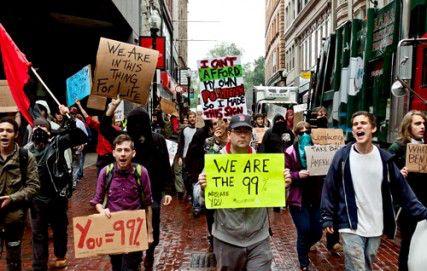
Occupy Boston’s next large move will not involve physical occupation, protesters from the group said.
Rather than convening and demonstrating as a large group, the Occupy movement in Boston now tends to consist of smaller, more diversified groups, said Jay Kelly, an Occupy Boston protester who has been involved with the movement since the first General Assembly.
Members tend to work with the groups they feel the most passionate about, he said.
“It really shows what Occupy represents – it’s very horizontal,” he said. “There’s not one person calling the shots. You can go out and do action because you feel good about it and because you’re passionate about it. It isn’t one person saying, ‘Let’s all go here.’”
Some occupiers have been sleeping outside of a Bank of America building in “sleepful protest,” while others have been involved with Camp Charlie and other protests against the Massachusetts Bay Transportation Authority, Kelly said.
Occupier Bill Lewis, who works on the Facility Team and has been with the movement since its first week, called Camp Charlie a “short-term occupation.”
Occupiers set up sleeping bags directly in front of the Massachusetts State House, protesting and sleeping there from April 4 to April 14 and disbanding for one night at the behest of the U.S. Secret Service while it secured the area for the arrival of Brazilian president Dilma Rousseff, according to The Boston Occupier.
“It’s good because it was all legal. There were no cops around,” Lewis said, referring to the MBTA-related occupation. “It was almost lonely without the cops around.”
Camp Charlie may serve as a model for future short-term occupations, Lewis said.
He said, however, Occupy Boston members “talk about [reoccupation] all the time. Definitely not back to Dewey, though. There are whispers about all sorts of [possible reoccupation sites].”
Protesters are considering occupying a bank, occupying another building or even renting a building or occupying a different park, he said.
“[The site would be an] easily accessible or somehow significant location,” Lewis said. “Nothing is definite.”
The group has discussed becoming mobile, constructing tent-trailers – tents attached to bicycles – and occupying areas sporadically and temporarily, he said.
The plan, Lewis said, is to “set up mobile brigades with tents . . . zipping through towns and setting up tents in unsuspecting neighborhoods and then . . . zip[ping] away from the police and escape into the darkness.”
While Occupy Boston discusses future occupation, the Boston University Occupy group has turned to different types of protest, said College of Arts and Science junior Brandon Wood, who created the BU Occupies Boston Facebook page.
“Everyone is still working toward activism, but in a different flavor,” he said. “[Occupy] serves its purpose by connecting a group of people and establishing a group of activists.”
In the future, Occupy Boston intends to organize “A Day Without the 99 Percent,” a general strike on May 1, International Workers’ Day.
Occupiers said they plan to demonstrate on May 1, also known as May Day or Labor Day, by skipping work, walking out of school and refraining from shopping, banking or conducting business throughout the day.
In America, International Workers’ Day is annually marked by demonstrations throughout the world and commemorates the 1886 Haymarket Massacre in Chicago, during which laborers protested for an eight-hour work day, according to the Industrial Workers of the World website.
During the third day of protest, police shot and killed two of the tens of thousands of protesters assembled.
In a public meeting the next day, after someone threw a bomb into the ranks of the police – resulting in the eventual deaths of seven policemen – police opened fire into the crowd, killing at least one civilian and wounding many more, according to labor historian Philip Foner’s “May Day: A Short History of the International Workers’ Holiday.”
In Occupy Boston’s commemoration of the holiday, the group’s strike “would demand immigrant rights, environmental sustainability, a moratorium on foreclosures [and] the end of current wars and jobs for all,” according to The Boston Occupier.
“It’s a positive thing to show the breadth of involvement [in the Occupy community],” Kelly said. “Occupy is so broad because it accepts lots of different issues.”


















































































































